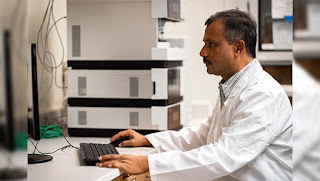Graduate student recognized for excellence in poultry science

Pravin holding award For his outstanding academic performance, research contributions, and service to professional community, Pravin Mishra , a graduate student in the University of Hawaiʻi at Mānoa College of Tropical Agriculture and Human Resources (CTAHR) was awarded the Poultry Science Association (PSA) Hatchery’s Student of the Year 2024 Award. The award includes a certificate of recognition and a $1,000 travel grant to attend the 2025 PSA annual meeting in Raleigh, North Carolina. Mishra has also been elected as junior student director for PSA, where he will serve on the board of directors and PSA Hatchery Advisory Committee. Mishra’s election showcased his commitment to the association’s goals of providing educational, social and professional support to student members. In addition, his exemplary service as the Chair of the Project Innovation Committee for PSA Hatchery (2022–24) was also celebrated, where he spearheaded collaborative projects. “Winning these awa...
